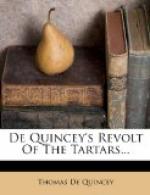INTRODUCTION.
Thomas De Quincey is one of the eccentric figures in English literature. Popularly he is known as the English Opium-Eater and as the subject of numerous anecdotes which emphasize the oddities of his temperament and the unconventionality of his habits. That this man of distinguished genius was the victim—pitifully the victim—of opium is the lamentable fact; that he was morbidly shy and shunned intercourse with all except a few intimate, congenial friends; that he was comically indifferent to the fashion of his dress; that he was the most unpractical and childlike of men; that he was often betrayed, because of these peculiarities, into many ridiculous embarrassments, such as are described by Mr. Findlay, Mr. Hogg, and Mr. Burton,—of all this there can be no doubt; but these idiosyncrasies are, after all, of minor importance, the accidents, not the essentials in the life and personality of this remarkable man. The points that should attract our notice, the qualities that really give distinction to De Quincey, are the broad sweep of his knowledge, almost unlimited in its scope and singularly accurate in its details, a facility of phrasing and a word supply that transformed the mere power of discriminating expression into a fine art, and a style that, while it lapsed occasionally from the standard of its own excellence, was generally self-corrective and frequently forsook the levels of commonplace excellence for the highest reaches of impassioned prose. Nor is this all. His pages do not lack in humor—humor of the truest and most delicate type; and if De Quincey is at times impelled beyond the bounds of taste, even these excursions demonstrate his power, at least in handling the grotesque. His sympathies, however, are always genuine, and often are profound. The pages of his autobiographic essays reveal the strength of his affections, while in the interpretation of such a character as that of Joan of Arc, or in allusions like those to the pariahs,—defenceless outcasts from society, by whose wretched lot his heart was often wrung,—he writes in truest pathos.
Now sympathy is own child of the imagination, whether expressed in the language of laughter or in the vernacular of tears; and the most distinctive quality in the mental make-up of De Quincey was, after all, this dominant imagination which was characteristic of the man from childhood to old age. The Opium-Eater once defined the great scholar as “not one who depends simply on an infinite memory, but also on an infinite and electrical power of combination, bringing together from the four winds, like the angel of the resurrection, what else were dust from dead men’s bones, into the unity of breathing life.” Such was De Quincey himself. He was a scholar born, gifted with a mind apt for the subtleties of metaphysics, a memory well-nigh inexhaustible in the recovery of facts; in one respect, at least, he was




